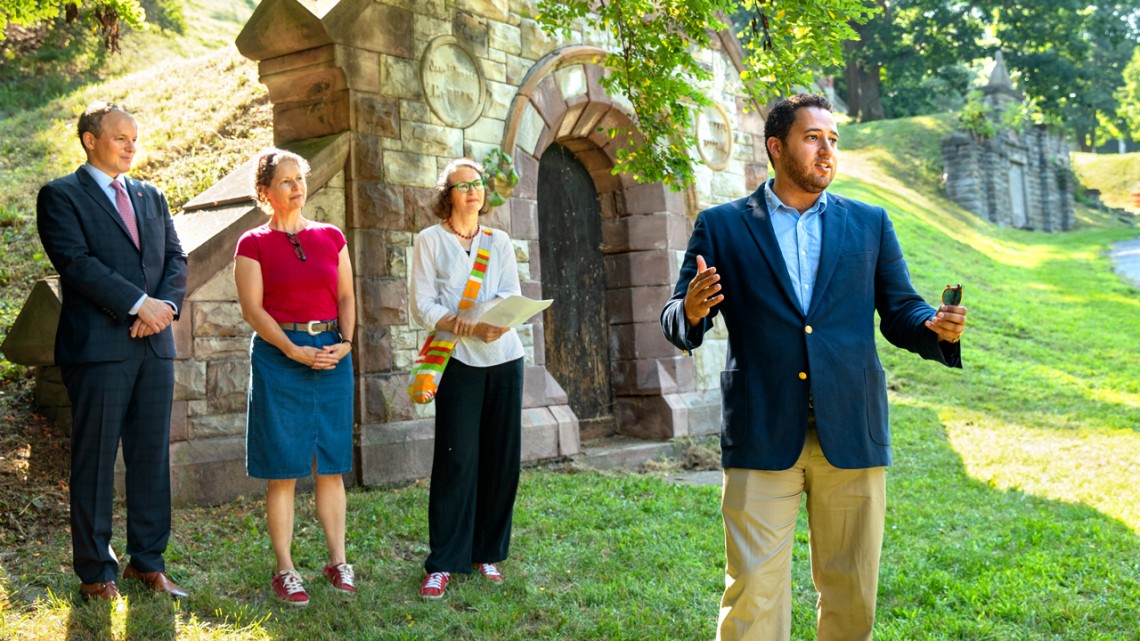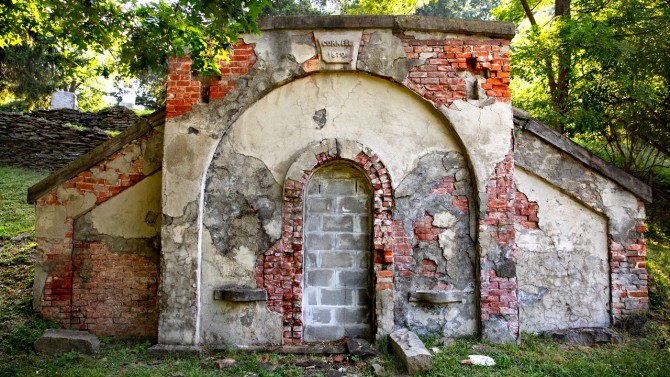
Ithaca Mayor Svante Myrick ’09, right, speaks at the University Avenue entrance to the Ithaca City Cemetery July 30. Behind him are, from left, Joel Malina, Cornell vice president for university relations; Julee Johnson, former board president of Historic Ithaca and one of the co-founders of Friends of the Ithaca City Cemetery; and Christine O’Malley, preservation services coordinator for Historic Ithaca.
Cornell partners with city to restore historic cemetery
By Joe Wilensky
Cornell University is contributing $75,000 toward the preservation and maintenance of the Ithaca City Cemetery, joining in a partnership with the city of Ithaca to help repair and restore hillside vaults at the 16-acre historic site.
The cemetery – nestled between University Avenue, DeWitt Place and Cornell Avenue – is owned by the city and is the oldest cemetery in Ithaca, in use since the 1790s. While the city handles routine maintenance at the site, Historic Ithaca and its affiliate, the Friends of the Ithaca City Cemetery, advocate for its preservation, coordinate volunteer efforts and host clean-up days.
On July 30, representatives from the city, Historic Ithaca and Cornell gathered at the cemetery’s lower entrance to announce the partnership and to reflect on the site’s important cultural and historical role in the community and the importance of its upkeep. The pastoral burial ground is the final resting place of numerous city families and university-related notables, including descendants of university founder Ezra Cornell.
“The city cemetery stands here as an important visual record of our community’s past and remains a significant cultural landscape as well, to be appreciated by all,” said Christine O’Malley, preservation services coordinator for Historic Ithaca.
Julee Johnson, a former board president of Historic Ithaca and one of the co-founders of Friends of the Ithaca City Cemetery, noted that the cemetery also is “an archive of information about thousands of early Ithacans.”
O’Malley traced the history of the cemetery, which expanded through the 19th century, its planning and landscaping shaped by the U.S. rural cemetery movement. It is no longer an active cemetery today, other than a small parcel owned by Ithaca’s Temple Beth El, where occasional burials are still held.
Ithaca Mayor Svante Myrick ’09 thanked members of Historic Ithaca and the Friends of the Ithaca City Cemetery for their passion, motivation and commitment to the cemetery. Myrick said the city realized it had neglected the site in past years and that urgent repairs, beyond volunteer conservation and upkeep work, were needed.
Last year, the city committed $75,000 in funding to enhance and upgrade the cemetery’s most fragile vaults.
“This is a gorgeous asset nestled right between the university and downtown Ithaca,” Myrick said, noting that students and city residents alike walk its paths, enjoy its setting and learn a bit about local history. “So investing in it only makes sense.”
Myrick said the city soon learned that the needed work couldn’t be achieved for just $75,000.
“I picked up the phone and called somebody who I thought might be interested, and that was [Cornell] President [Martha] Pollack,” he said. “She was committed right from the start. She understood what the Friends of the City of Ithaca Cemetery understand: This is an important part of our past, our present and our future.”
Joel Malina, Cornell vice president for university relations, said the university “was pleased to step forward with a contribution of $75,000” for the cemetery, which he called a “true local treasure.”
Many members of the Cornell family are interred at the cemetery, including a spouse and relatives of former New York Gov. Alonzo Cornell, and his older brother, Franklin C. Cornell; both were sons of university founder Ezra Cornell.
Malina noted just a few of the many other individuals with Cornell connections who are buried at the cemetery, including legendary Cornell professor Hiram Corson and emeritus professor and Cascadilla School founder Lucien Augustus Wait.
The Cornell contribution does not come with any specific requirements, but Malina noted that the university is “grateful that the area around the Cornell [family] vault is a place that the city staff hopes can be fortified.” Malina also thanked “all of you, and our neighbors, who care so much about this cemetery and our city’s history.”
“We are really delighted with this collaboration and the generosity of the city and Cornell University,” O’Malley said. “It really speaks to their commitment to this historic landscape, and it means a lot. It really will help us with the work, and we look forward to a lot of future repairs and improvements.”
Historic Ithaca’s cemetery clean-up days are open to the public. The next one is scheduled for 9:30 a.m. Sunday, Sept. 8; students from the Department of City and Regional Planning’s historic preservation program will participate.
The group hosts cemetery tours throughout the month of October; also in October, the annual Ithaca City Cemetery Sprint fundraiser is held. Details will be posted on Historic Ithaca’s Facebook page.
Media Contact
Get Cornell news delivered right to your inbox.
Subscribe

